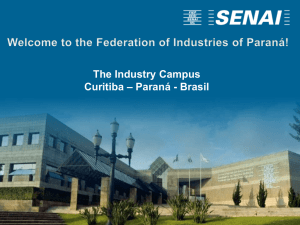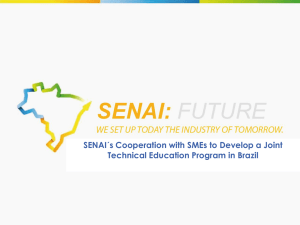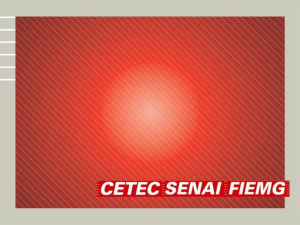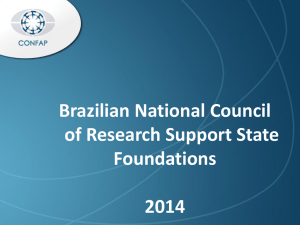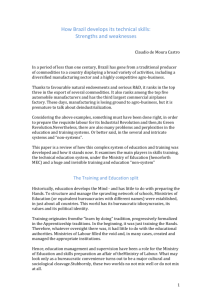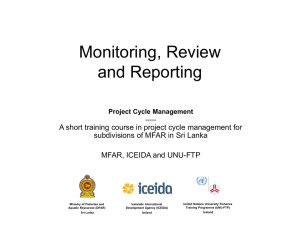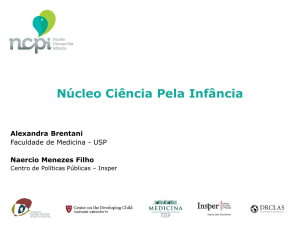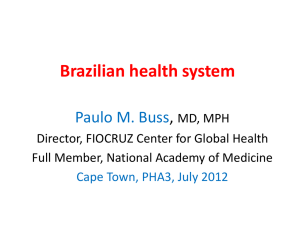File
advertisement
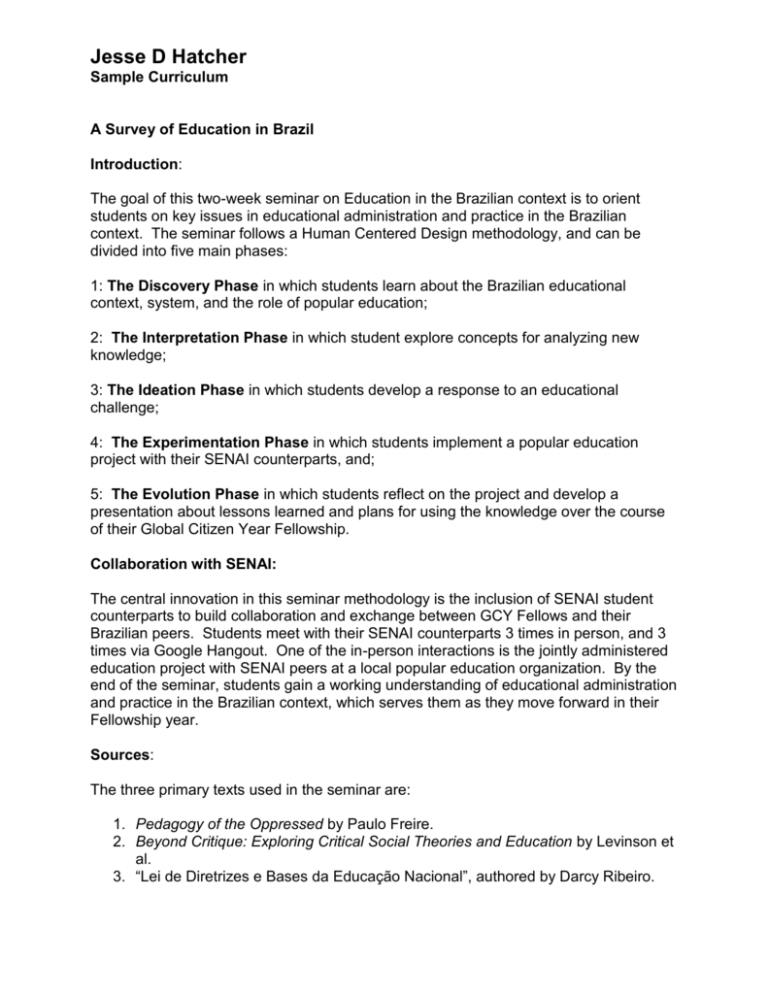
Jesse D Hatcher Sample Curriculum A Survey of Education in Brazil Introduction: The goal of this two-week seminar on Education in the Brazilian context is to orient students on key issues in educational administration and practice in the Brazilian context. The seminar follows a Human Centered Design methodology, and can be divided into five main phases: 1: The Discovery Phase in which students learn about the Brazilian educational context, system, and the role of popular education; 2: The Interpretation Phase in which student explore concepts for analyzing new knowledge; 3: The Ideation Phase in which students develop a response to an educational challenge; 4: The Experimentation Phase in which students implement a popular education project with their SENAI counterparts, and; 5: The Evolution Phase in which students reflect on the project and develop a presentation about lessons learned and plans for using the knowledge over the course of their Global Citizen Year Fellowship. Collaboration with SENAI: The central innovation in this seminar methodology is the inclusion of SENAI student counterparts to build collaboration and exchange between GCY Fellows and their Brazilian peers. Students meet with their SENAI counterparts 3 times in person, and 3 times via Google Hangout. One of the in-person interactions is the jointly administered education project with SENAI peers at a local popular education organization. By the end of the seminar, students gain a working understanding of educational administration and practice in the Brazilian context, which serves them as they move forward in their Fellowship year. Sources: The three primary texts used in the seminar are: 1. Pedagogy of the Oppressed by Paulo Freire. 2. Beyond Critique: Exploring Critical Social Theories and Education by Levinson et al. 3. “Lei de Diretrizes e Bases da Educação Nacional”, authored by Darcy Ribeiro. Jesse D Hatcher Sample Curriculum We will also use several articles and the film Pro Dia Nascer Feliz directed by João Jardim. Guest Speakers: 1. Dr. José, jose@unisul.br. Dr. José is the president of the Santa Catarina Chapter. I had the opportunity to work with him over the past year and is a very engaged volunteer and a well-connected scholar in Santa Catarina. 2. Mara Cruz of Mova Brasil, tmaracruz@yahoo.com.br. Mara works as the director for MOVA – Brasil, an expansive literacy program in Brazil. I worked with her during my independent study in Brazil a few years ago. 3. Dr. Dennis Werner, Dennisww@redel.com.br. Dr. Werner is an anthropologist at the Universidade Federal de Santa Catarina whose work I greatly respect. We spent two days together in Florianópolis and his knowledge base is astounding. High-level Seminar Outline Phase 1: Discovery Day 1: Seminar orientation and introduction to the Brazilian educational context Orient students on seminar format while discussing and developing learning goals. Introduce current trends and challenges in the Latin American educational landscape. Watch the documentary film Pró Dia Nascer Feliz to orient students on the realities of the Brazilian educational system. Sources: Pró Dia Nascer Feliz. Dir. João Jardim. Tambelini Filmes, 2007. DVD Day 2: Introduction to the Brazilian Educational System Exploration of the components of the Brazilian Educational System, with particular emphasis on the SENAI technical school system, the higher education system, and social programs that work in conjunction with public education, esp. Bolsa Familia and Pro Uni. Near the end of class, students meet with SENAI counterparts for the first time via Google Hangout. Sources: n.p. “Lei de Diretrizes e Bases da Educação Nacional.” Ministério da Educação. 1996. PDF. 28th June 2011. n.p. “ProUni.” Ministério da Educação. n.d. Web. 15th July 2011. http://prouniportal.mec.gov.br/ . n.p. Bolsa Familia. Ministério de Desenvolvimento Social e Combate à Fome. n.d. Web. 18th March 2011. http://www.mds.gov.br/bolsafamilia . Jesse D Hatcher Sample Curriculum Resende, Tatiana. “Falta de mão de obra qualificada prejudica 69% das empresas.” Folha. 6 April 2011. Web. 6 April 2011. Day 3: Popular education in Brazil Lecture on the life and work of Paulo Friere and his influence on Brazilian education today, with particular emphasis on the MOVA Brasil program as it exists today. Sources: Freire, Paulo. Education for Critical Consciousness. [New York]: Herder and Herder, 1970. Freire, Paulo. Pedagogy of the Oppressed. [New York]: Herder and Herder, 1970. n.p. Paulo Freire. Instituto Paulo Freire. n.d. Web. 2nd July 2011. http://www.paulofreire.org. Phase 2: Interpretation Day 4: Issues in Education Administration Exploration of key frameworks for understanding the process of educational reform, with particular attention to analyzing the Brazilian education reform of 1988 and subsequent reforms through the lenses of Marx, Weber, and Gramsci. Sources: Levinson, Bradley et al. “Forerunners and Foundation Builders: Origins of a Western Critical Social Theory Tradition.” Levinson et al. 25-50. Gross, Jacob. “Education and Hegemony: The Influence of Antonio Gramsci.” Levinson et al. 51-79. Day 5: Issues in Educational Praxis Exploration of the role of popular education in challenging and subverting the traditional student/teacher educational framework, the limitations of the popular education model, and an introduction to educational techniques that facilitate student participation. Fellows complete 2nd Google Hangout interaction with SENAI counterparts. Sources: 4. Arnove, Robert F. and Fink, Marcy. “Issues and Tensions in Popular Education in Latin America.” International Journal of Educational Development. 11. 3 (1991): 221-230. PDF. Phase 3: Ideation Day 6: Meet SENAI counterparts and explore project ideas Jesse D Hatcher Sample Curriculum Travel to SENAI and interact with students. Begin advancing project ideas for education project with Popular education organization. Develop priority tasks for further lesson plan development and refinement. Day 7: Refine implementation ideas for project Refine ideas and generate a formal plan for education project implementation. Meet with SENAI counterparts via Google Hangout to report and get feedback on formalized lesson plan. Phase 4: Experimentation Day 8: Implement popular education project with SENAI counterparts. Travel to popular education organization and implement project. Phase 5: Evolution Day 9: Reflect on project experience and create a project presentation. Meet via Google Hangout with SENAI counterparts to reflect on experience, create a list of successes, challenges, and areas for improvement in the future. Use feedback from SENAI counterparts to develop a presentation on the project and seminar as a whole. Day 10: Reconvene with SENAI counterparts and present on experiences Travel to SENAI school, reconnect with SENAI counterparts, give presentations, and explore ways to collaborate in the future. End of Outline
